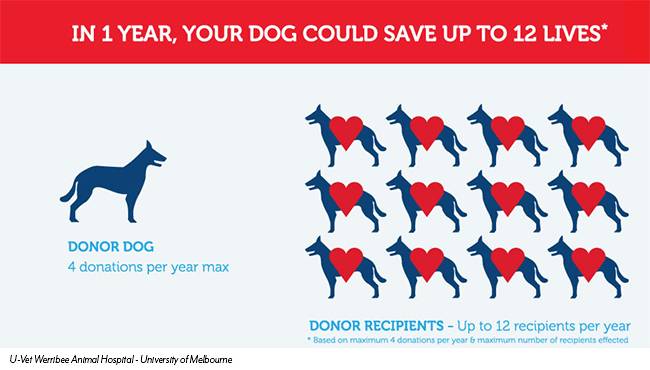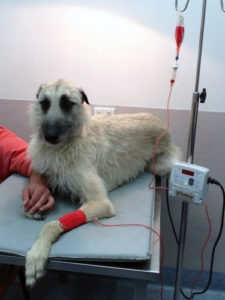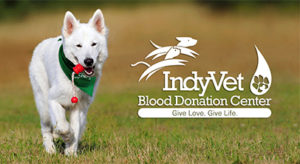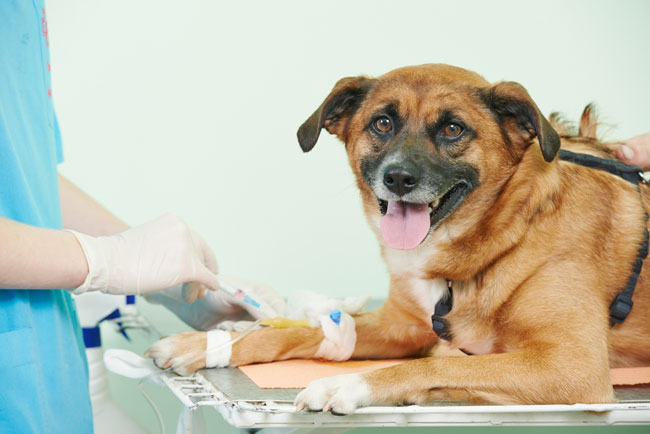Just like humans, canines sometimes need life-saving blood transfusions.
Did you know that dogs have different blood types? Canine blood types are determined by elements in the blood known as dog erythrocyte antigens (DEA). While scientists have discovered at least a dozen different types of blood based on DEAs, vets consider DEA 4 to be the universal type. When a dog needs a transfusion, vets turn to donor dogs who have this universal type to provide life-saving blood.
 In some cases, canine donors “work” at veterinary schools and animal blood banks. In addition, some veterinary hospitals have donor dogs “on staff” who can donate blood when needed; however, other hospitals rely on voluntary donors. These dogs live with their owners and are “on-call” as needed by local veterinarians.
In some cases, canine donors “work” at veterinary schools and animal blood banks. In addition, some veterinary hospitals have donor dogs “on staff” who can donate blood when needed; however, other hospitals rely on voluntary donors. These dogs live with their owners and are “on-call” as needed by local veterinarians.

How does a dog become a blood donor? An ideal canine blood donor weighs at least 50 lb. and is between 1- and 7-years old. A breed with a short face—such as a bulldog or pug—does not make a good candidate, nor does a dog with a longhaired coat (however, long hair doesn’t rule out a candidate). An ideal blood donor dog has a laid-back, friendly and calm personality, and is not stressed out by visits to the veterinary office. Most importantly, the dog is in exceptionally good health, meeting these criteria:
- Free of Lyme disease and other blood-borne illnesses
- Up-to-date on all vaccinations
- Currently taking heartworm preventatives
Additional requirements for canine blood donors vary from state to state. For more information on how your dog can become a blood donor, talk to your veterinarian or local veterinary school. These organizations can also provide more information:
- IndyVet, Indianapolis, Indiana:317-782-4484
- Blue Pearl Blood Bank of Houston, Houston, Texas: 281-890-8875
- Blue Ridge Veterinary Blood Bank, Purcellville, Virginia: (540) 338-7387
- Hemopet, Garden Grove, California:714-891-2022
 If your dog meets the blood donating requirements, your veterinarian will contact if you if they need a donation. Some clinics might request that your dog does not eat before the donation; however, you should continue to provide her access to fresh water. At the vet’s office, the staff will make your dog extra comfortable and perhaps shave a small area on her front leg or neck to prepare a donation site. They will also clean it thoroughly.
If your dog meets the blood donating requirements, your veterinarian will contact if you if they need a donation. Some clinics might request that your dog does not eat before the donation; however, you should continue to provide her access to fresh water. At the vet’s office, the staff will make your dog extra comfortable and perhaps shave a small area on her front leg or neck to prepare a donation site. They will also clean it thoroughly.
The equipment used to draw blood from canines is often the same as that for humans. When your dog is lying down quietly or resting comfortably on her side, a veterinary technician will gently insert the needle in the dog’s vein. Some dogs don’t seem to feel this, but in some cases, the tech will apply a topical anesthetic to the site prior to inserting the needle.
The donation process takes about 10 minutes. The tech will monitor your dog during the process to ensure she is comfortable and the blood is flowing well. When enough blood has been collected, the tech will remove the needle and apply a light bandage to the site.
Most dogs love the next step: treats. Just as with human blood donations, canine donors receive a small meal and access to plenty of water. Your dog will be observed for a certain amount of time (usually 30 minutes or so) and then is free to return home.
Once home, your responsibility is to let your dog relax and tell her how proud you are.





